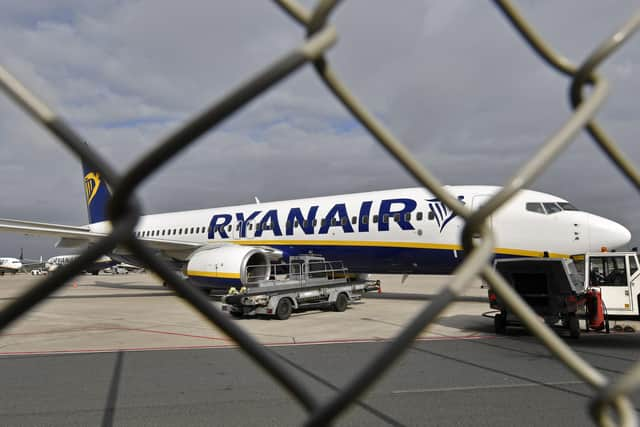Bullish Ryanair to carry up to 100 million passengers as it eyes post-Covid recovery
The Irish airline upped its forecast to fly between 90 million and 100 million people in the year ending March 2022, up from the lower end of an 80 million to 120 million range it previously forecast.
The announcement came as the group reported a loss of €273 million (£234m) in the first quarter of the year, warning that the pandemic continued to “wreak havoc” on the business.
Advertisement
Hide AdAdvertisement
Hide AdThe firm said traffic in the first quarter was up to 8.1 million from just 500,000 in the same quarter last year, but the losses are higher than the €185m in the same period of 2020 during the first period of lockdown.


It said: “FY22 continues to be challenging, with Covid-19 travel restrictions prolonging uncertainty.
“Following the July 1 rollout of EU digital Covid certificates (and the relaxation of the UK’s quarantine rules) for fully-vaccinated persons, our group has seen Q2 bookings recover strongly (albeit at low fares).
“We believe that FY22 traffic has improved to a range of 90m to 100m (previously guided at the lower end of an 80m to 120m passenger range) and (cautiously) expect that the likely outcome for FY22 is somewhere between a small loss and breakeven.
“This is dependent on the continued rollout of vaccines this summer and no adverse Covid variant developments.”
Ryanair flew 27.5 million people in the year to March 2021, down from 148.6 million in the previous year.
The airline added: “Covid-19 continued to wreak havoc on our business during Q1 with most Easter flights cancelled and a slower than expected easing of EU govt. travel restrictions into May and June.
“Significant uncertainty around travel green lists (particularly in the UK) and extreme government caution in Ireland meant that Q1 bookings were close-in and at low fares.”
Advertisement
Hide AdAdvertisement
Hide AdRichard Flood, investment manager at Brewin Dolphin, noted: “Ryanair’s Q1 update confirms what we already knew: the summer of 2021 has got off to a slower start than hoped.
“Ryanair, though, remains in rude health – both financially and operationally – and is poised like a stretched elastic band to benefit from the pent-up demand for travel and resume normal operations as soon as conditions allow.”
Mark Crouch, an analyst at investment platform eToro, said: “Ryanair has upped its passenger number forecasts for the year, although it’s clear that it doesn’t see a full recovery in passenger numbers until perhaps 2023. Its first-quarter trading update shows it is also incredibly bullish about life after the pandemic.
“While some of its rivals have needed state bail outs, the Irish budget carrier has managed to build up an enviable cash balance of more than €4 billion and slash its debts by 27 per cent this year – all while much of its fleet was grounded.
“It is pinning a lot of its future hopes on its new B737-8200 ‘gamechanger’ fleet of aircraft, the first of which arrived in June.
“There is no doubt we are some way away from a return to pre-Covid passenger numbers, but when that does happen, Ryanair is well placed to capitalise, given the budget end of the market is likely to recover first.”
